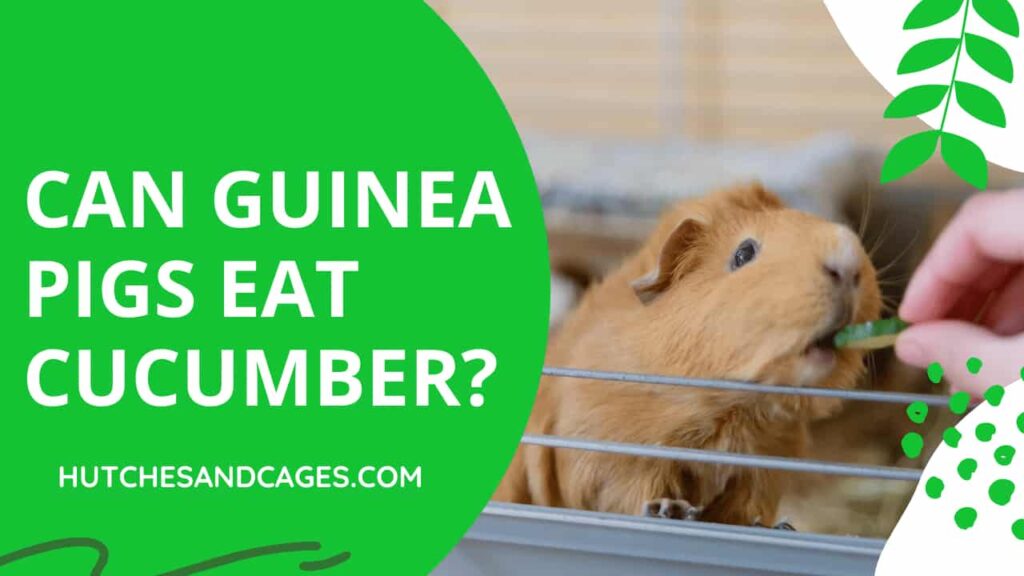Cucumbers ???? are great in summers but can your little guinea pig enjoy this incredible food too?
This is the most common question that a guinea pig owner can have in his mind.
If guinea pigs can eat cucumber, what are their health benefits of feeding them to your adorable guinea pig?
Can Guinea Pigs Eat Cucumber? Guinea pigs can eat cucumbers, and it is an excellent choice for them, especially in summers. But make sure you only feed in a moderate amount like two or three times a week.
Let’s explore more about cucumbers ???? and guinea pigs in this blog.
Can Guinea Pigs Eat Cucumber?

Guinea pigs can eat cucumber as well as their skin, seeds, and peel. If you own a guinea pig, you should feed it various fruits and vegetables to give them a balanced diet full of nutrients. Cucumber also contains some nutrients that are healthy for guinea pig’s health.
Cucumber is refreshing, hydrating, and nutritious with a lot of health benefits. Every part of cucumber is safe for your adorable guinea pig.
Cucumber has low nutrient content and high water content almost about 95% that is why it is considered a form of refreshment. Guinea pigs are herbivores, and they have specific health benefits of eating cucumbers.
Potential Health Benefits of Cucumbers
Some of the health benefits of cucumbers to guinea pigs are:
Provides Hydration
Cucumber is an excellent source of water that provides refreshment, especially in hot summer days. Cucumber is a fresh treat for your guinea pig, and it keeps them hydrated.
Maintains healthy weight
Cucumber helps your guinea pig achieve a healthy weight without getting chubby because it is light for digestion. Cucumbers are mainly water, low in sugar, fats, and calories.
Antioxidants
Cucumbers contain nutrients like Vitamin A that acts as antioxidants and protects guinea pig’s body from free radicals.
Antioxidants reduce the risk of diseases in general and strengthen the immune system. Moreover, Vitamin A also prevents and fights against inflammation.
Gives Protection from Scurvy
Cucumber also has Vitamin C that is essential for guinea pigs because they are prone to scurvy. Amount of vitamin C is not very high in cucumbers, but it is enough to prevent your guinea pig from scurvy.
Can Guinea Pigs Eat Cucumber Every Day?
No, guinea pigs can’t eat cucumber every day. It is only recommended to feed a few times a week. If you feed cucumber daily to your little guinea pig, it can lead to several digestive severe problems.
Guinea pigs need a diverse diet for a healthy life. This mixed diet gives them several minerals and vitamins that are healthy for them.
If we talk about cucumber, it is a safe vegetable for guinea pigs but only 2 to 3 times a week.
How many cucumbers can you give to a guinea pig?
You can give cucumber to your guinea pig a few times a week. For instance, feeding them cucumber up to 3 to 4 times a week at maximum is healthy for the guinea pig.
It is good to mix cucumber with other vegetables so that guinea pig can eat various nutrients from a diet at once.
Can Guinea Pigs Eat Cucumber Skin?
Some people prefer to eat cucumber with skin while other eats it without skin. But can your little guinea pig eat cucumber skin?
Guinea pigs can also eat cucumber skin, and they are entirely safe for them just like cucumber itself. Cucumber skin contains several nutrients such as minerals, vitamins, and fibre that are healthy for guinea pig’s health.
Every part of cucumber is safe for your little guinea pig. Just make sure to wash the cucumber before feeding your guinea pig.
It is totally upon you whether you want to remove skin or not, but as mentioned above, cucumber skin is entirely safe for guinea pigs.
Can Guinea Pigs Eat Cucumber Leaves?
Guinea pigs can eat cucumber flesh, skin, and seeds, but what about cucumber plant leaves? Can guinea pigs eat cucumber leaves too?
Guinea pigs can have cucumber leaves, but only in moderation, that means only in a small amount not excessively. However, if you overfeed cucumber leaves to your adorable guinea pig, then it can get serious digestive problems like vomiting and diarrhoea.
Cucumber leaves are healthy for guinea pigs because they contain oxalic acid that is helpful for your pet.
Always feed them young, fresh, and raw cucumber leaves and wash them thoroughly with clean water to remove pesticides.
Can Guinea Pigs Eat Cucumber Flowers?
As I discussed above, all the cucumber parts, including skin, leaves, seeds, etc. are safe for guinea pig but can guinea pigs also eat cucumber flowers?
There is no evidence that cucumber flowers are healthy for guinea pigs, and their safety is unknown. So, I will recommend it is not prudent to decide what is safe for your little guinea pig.
Can Guinea Pigs Eat Cucumber Seeds?
Many seeds are not healthy and recommended to feed guinea pigs, but can they eat cucumber seeds?
Yes, Guinea pigs can eat cucumber seeds, and these are not harmful to them.
Can Guinea Pigs Eat Cucumber Peels?
Yes, guinea pigs can eat cucumber peels along with the seeds and leaves. They contain oxalic acid in a small amount that is healthy for guinea pig’s body.
Final Thoughts
Cucumber is a fruit that is rich in fibre and water. It is safe for a guinea pig as they provide several health benefits to them. If you are thinking to treat your guinea pig with some vitamins and nutrients, then go for cucumber.
Cucumbers are safe for guinea pigs and provide several health benefits, including hydration, maintaining a healthy weight, preventing scurvy, and several others.
Just keep an eye that you don’t overfeed cucumber to your guinea pig so it could lead to different digestive issues, including vomiting and diarrhoea. Try not to feed cucumber more than a few times a week or only one or two slices per serving are safe and healthy.
SmallPetsX.Com does not provide veterinary advice. Our aim to help small pet owners understand their pets a little better so that they can provide their pets with the life they deserve. All content is therefore for informational purposes only. If you're concerned about the health of your pet you should seek medical advice from a vet.




